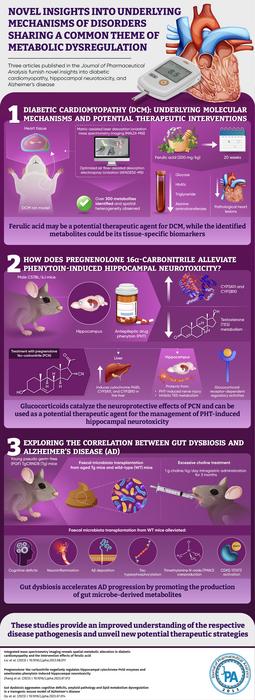DCM is the leading cause of heart failure in patients with chronic diabetes. However, the underlying mechanisms of DCM are poorly understood, and treatment options are limited. Another mystery is the regulation of cytochrome P450 enzymes (CYPs) in the central nervous system. Moreover, the link between the gut microbiome, microbiota-derived metabolites, and the progression of AD remains unknown. In the December issue of JPA, three articles provide insights into the pathologies of DCM, hippocampal neurotoxicity, and AD, providing a comprehensive exploration of these interconnected diseases.

Credit: Journal of Pharmaceutical Analysis
DCM is the leading cause of heart failure in patients with chronic diabetes. However, the underlying mechanisms of DCM are poorly understood, and treatment options are limited. Another mystery is the regulation of cytochrome P450 enzymes (CYPs) in the central nervous system. Moreover, the link between the gut microbiome, microbiota-derived metabolites, and the progression of AD remains unknown. In the December issue of JPA, three articles provide insights into the pathologies of DCM, hippocampal neurotoxicity, and AD, providing a comprehensive exploration of these interconnected diseases.
In the first study, researchers used mass spectrometry imaging (MSI), a technique combining the specificity of mass spectrometry (MS) with spatial imaging information, to map region-specific metabolites in the rat heart. Their findings, available online on 17 August 2023, were published in Volume 13, Issue 12 of the journal in December 2023. The team developed DCM mouse models to visualize region-specific metabolites, and analyze the effect of ferulic acid, an anti-myocardial injury drug. They used optimized ambient air-flow-assisted desorption electrospray ionization (AFADESI)-MSI to detect maximum number of metabolites and used matrix-assisted laser desorption ionization (MALDI)-MSI to increase coverage and resolution. MSI analyses of frozen rat heart tissue sections revealed heterogenous metabolic activity and region-specific distribution of the metabolites. Blood biochemical analyses showed decreased levels of glucose, HbA1c, triglycerides, and alanine aminotransferase in response to a high dose of ferulic acid for 20 weeks. “Our novel method unveiled metabolic changes in DCM rat hearts and is the first to explore alterations and spatial distribution of endogenous metabolites in the diabetic heart,” say corresponding authors Dr. Zeper Abliz and Dr. Zhonghua Wang.
The second study, available online on 25 July 2023, aimed to understand the regulation of CYPs in the hippocampus in response to antiepileptic drug, phenytoin (PHT). PHT causes neuronal damage and cognitive impairment, leading to increased expression of CYP-mediated testosterone metabolism. The study found that pregnenolone 16α-carbonitrile (PCN), a pregnane X receptor (PXR) agonist, relieved PHT-induced neuronal side effects. Surprisingly, PCN increased hepatic CYP expression but decreased hippocampal CYP3A11 and CYP2B10 expression. The hippocampal CYP suppression by PCN was independent of PXR but associated with the activation of glucocorticoid receptor signaling pathway. Corresponding authors Hui Wang and Dan Xu conclude, “We propose glucocorticoids as a potential therapeutic strategy for mitigating the neuronal side effects of PHT. Within the coming 5 to 10 years, this research holds the potential to drive substantial progress in the field of PCN, potentially revolutionizing our understanding of PCN’s mechanisms within the body.”
The third study, available online on 28 July 2023, attempted to demonstrate the link between gut microbiome and AD progression. It found that gut dysbiosis in transgenic AD mice increased the levels of trimethylamine N-oxide (TMAO), which activated the CDK5/STAT3 pathway in the brain, leading to enhanced cognitive impairment. Fecal microbiota transplantation from non-transgenic mice mitigated neuronal inflammation. “The involving microbiota-gut-brain axis mechanisms underlying AD pathology may afford a new perspective on the novel targets for AD treatment,” explain corresponding authors Dr. Yan-Fang Xian and Dr. Zhi-Xiu Lin.
Overall, these studies pave the way for further research and improved treatment strategies.
***
Reference
DOI:
https://doi.org/10.1016/j.jpha.2023.08.011
https://doi.org/10.1016/j.jpha.2023.07.013
https://doi.org/10.1016/j.jpha.2023.07.014
Journal
Journal of Pharmaceutical Analysis
DOI
10.1016/j.jpha.2023.08.011
Method of Research
Experimental study
Subject of Research
Cells
Article Title
Integrated mass spectrometry imaging reveals spatial-metabolic alteration in diabetic cardiomyopathy and the intervention effects of ferulic acid
Article Publication Date
1-Dec-2023
COI Statement
The authors declare that there are no conflicts of interest




